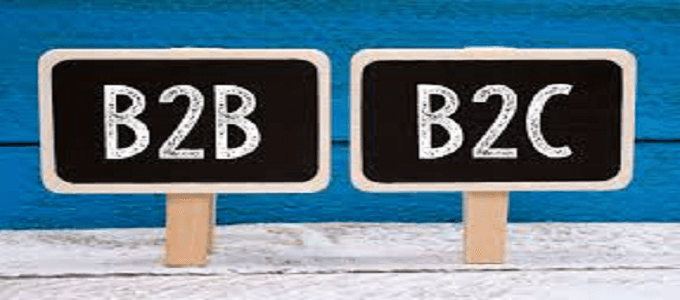
The Differences Between B2C and B2B Markets. What Every Marketer Should Know.
B2C vs B2B Markets
Business-to-business (B2B) and business-to-consumer (B2C) markets differ in fundamental ways. Although both are comprised of producers moving products and services through distribution to sellers, the manner in which transactions happen is distinct. Major differences are summarized in the table below.

The goal of both B2C and B2B marketers is to create buyers. However, marketers in each respective arena go about that task in very different ways. In the consumer marketplace, messaging centers around the product and features offered – size of TV screen, resolution, length of warranty, etc. In the B2B marketplace, the focus is on the relationship between buyer and seller. The buyer will often consider questions such as:
- Do I know and trust the salesperson to advocate for me if there is an issues or problem?
- Will the vendor provide adequate and timely technical support? Do they have enough tech support staff?
- Will they make ordering easy and efficient?
- Are their customer service reps knowledgeable about their product line and able to answer most questions quickly and accurately?
- Can I trust the company to price their products and services fairly?
- And many others.
B2C products are relatively simple – a gallon of gas, an entrée at a restaurant, or even a tube of toothpaste. The consumer has the choice of purchasing the product or not – and sometimes the option of considering an extended warranty for some durable goods. A typical B2B product, on the other hand, is relatively complex. A piece of machinery will differ from competitive offerings in the technology used, difficulty of installation, operator training required, level of productivity, required maintenance, availability of technical support, ancillary changes in other machines or raw material movement, and many other factors – all of which places greater demands on the decision makers within the purchasing business. In many cases, the buyers know as much about the product and production process as the seller – leading to rather intense negotiations.
Also, B2B buying decisions tend to be made by a group – typically representatives of each affected functional area including technical, operations, quality, finance, engineering, and purchasing. Once the vendor and product is selected, future purchases may be made by purchasing alone, depending upon the frequency of purchase and rate of technology change.
B2B buyers are more concerned about the long-term value of a product or service. While the price needs to be competitive and fair, the total cost in use or system cost, or lifetime cost are more important. Premium prices can be fairly easily justified by long-term savings in speed or throughput, durability, fitness for use, ease of operation, ease of maintenance, etc. Consequently, B2B buyers are usually extremely knowledgeable about the product they are buying, including raw materials and their sourcing, production methods and relative efficiencies, inventory and shipping costs, quality control procedures, third-party shippers, return procedures, problem resolution process, and more.
Consumer marketplaces are characterized by thousands, millions or even billions of buyers. Consider personal care products, automobiles, financial services, and so on. And any one buyer, although perhaps a heavy user, will not have any visibility at the manufacturer level. In contrast, it is not at all unusual for a B2B buyer to represent 15-20% of total revenue of a manufacturer or service provider.
Because of these factors, marketing activities for B2C firms involve heavy focus on merchandising – managing the display and appearance of products, whereas B2B firms focus efforts more on informing and educating potential buyers about the product, how it is used, cost of ownership, service and maintenance, and other factors. B2B products are often customized for each customer/user through modification of features, adding modules, incorporating certain technology, even building from customer plans.

